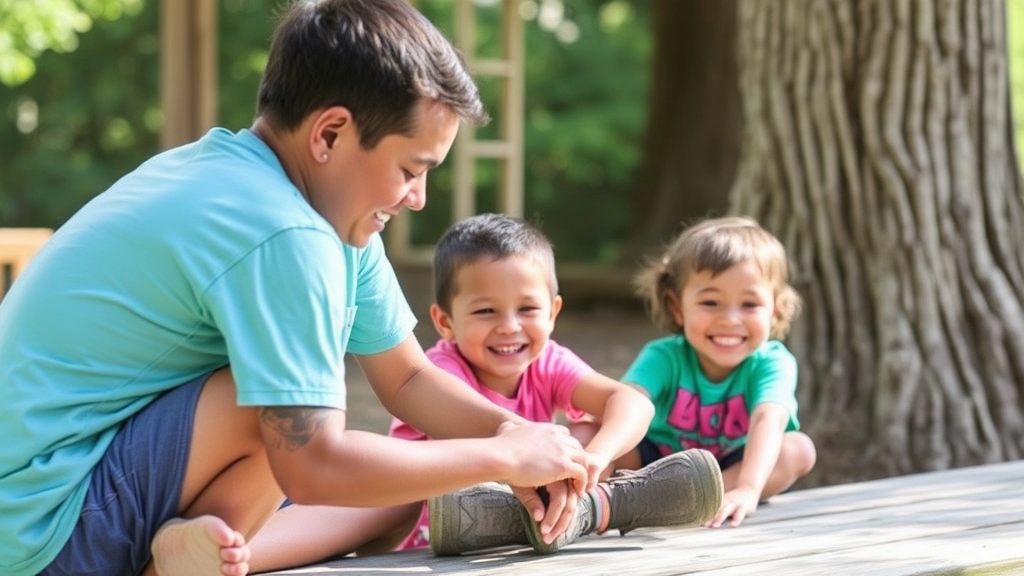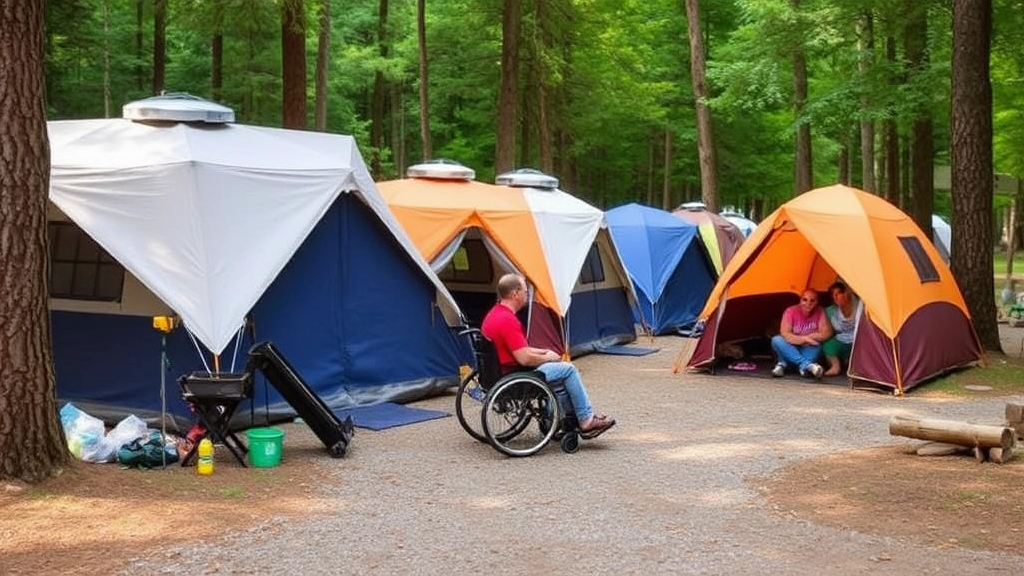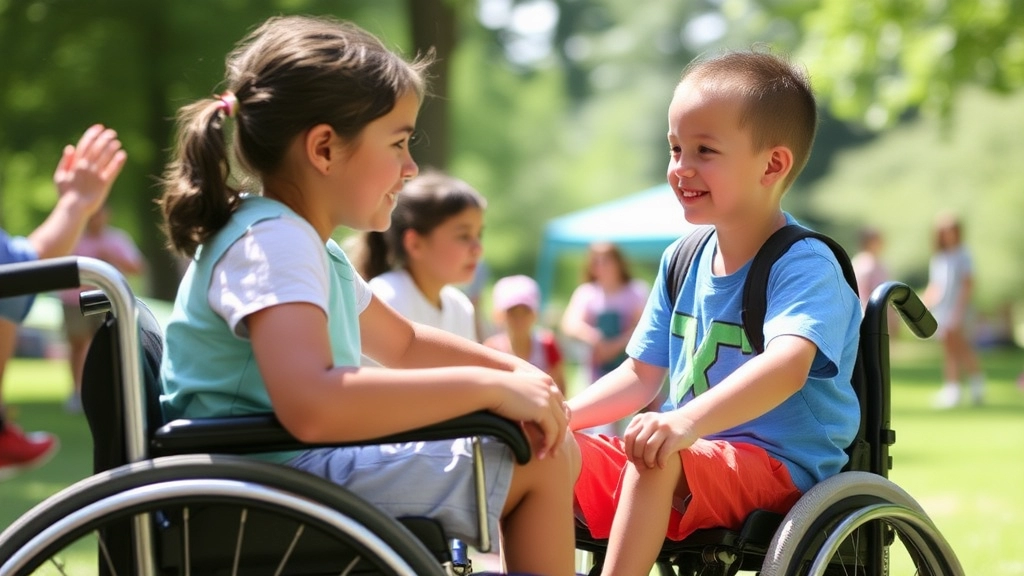Finding the Right Summer Camp for Your Child
Ever wondered if there’s a summer camp that can cater to your child’s specific needs? You’re not alone. Many parents grapple with this question, and it’s a biggie. From physical, intellectual, and sensory disabilities to emotional and behavioral disorders, specialized summer camps offer tailored support that ensures every child can participate fully. These camps are more than just a fun getaway; they provide essential medical and emotional support, foster social skills development, and offer barrier-free environments.
The Importance of Inclusive Summer Camps
Inclusive summer camps are a safe haven where children with special needs can thrive. They offer activities adapted to all abilities, from adaptive sports to creative arts, and ensure that no one feels left out. The staff at these camps are trained to handle various special needs, providing both medical and emotional support.
Benefits for Families
For families, these camps offer peace of mind and a sense of community, while also providing financial aid and scholarships to make the experience accessible for all. Dive into our comprehensive guide to find the perfect camp for your child and discover the transformative benefits that specialized summer camps offer.
Types of Disabilities Supported in Summer Camps
Ever wondered if there’s a summer camp that can cater to your child’s specific needs? You’re not alone. Many parents grapple with this question, and it’s a biggie. So, let’s break it down.
What Types of Disabilities Are Supported?
When it comes to summer camps, there’s a wide range of disabilities that are supported. Here’s a quick rundown:
- Physical Disabilities: Think mobility issues, cerebral palsy, or muscular dystrophy. Camps often have accessible facilities and activities tailored for these kids.
- Intellectual Disabilities: Includes Down syndrome, autism spectrum disorders, and other developmental delays. These camps focus on cognitive and social skills.
- Sensory Disabilities: This covers visual and hearing impairments. Camps usually have specialised equipment and trained staff to assist.
- Emotional and Behavioural Disorders: ADHD, anxiety disorders, and other emotional challenges. These camps provide structured environments to help manage these issues.
Physical Disabilities
Kids with physical disabilities often face barriers that can make traditional camps a no-go. But specialised camps? They’re designed with accessibility in mind. From wheelchair ramps to adaptive sports, these camps ensure that every child can participate fully.
Intellectual Disabilities
For children with intellectual disabilities, the focus is on creating a supportive and nurturing environment. These camps often have a higher staff-to-camper ratio and offer activities that stimulate cognitive development. Think of arts and crafts, music therapy, and interactive games.
Sensory Disabilities
Imagine a camp where a child with visual impairments can still enjoy nature hikes or a child who is deaf can participate in group activities. Camps that cater to sensory disabilities offer specialised resources like Braille materials, sign language interpreters, and adaptive technology.
Emotional and Behavioural Disorders
Kids with emotional and behavioural disorders need a structured yet flexible environment. Camps designed for these children often include behavioural therapists and structured routines to help manage anxiety, ADHD, and other challenges.
Real Stories, Real Impact
Take Sarah, for example. She’s a 10-year-old with cerebral palsy who attended a specialised camp last summer. Her mum was initially worried about how she’d cope. But guess what? Sarah had the time of her life, making friends and even trying out adaptive kayaking. Her confidence skyrocketed.
Why This Matters
Choosing the right camp can be a game-changer for your child. It’s not just about fun; it’s about growth, independence, and making lifelong memories. So, if you’re on the fence, know that there’s likely a camp out there that can meet your child’s unique needs. Check out our Ultimate Guide to Kids Summer Camps for more information. Also, explore the Summer Camp Indoor Activities to find the perfect fit for your child.
Inclusive Summer Camps: A Safe Haven for All

Ever wondered if there’s a place where your child can feel truly accepted and supported?
Welcome to inclusive summer camps.
These camps are a game-changer for kids with special needs.
They offer a safe haven where everyone feels welcome, no matter their abilities.
What Makes Inclusive Summer Camps So Special?
First off, they’re designed with every kid in mind.
No one gets left out.
Think about it—your child can join in on all the fun without feeling different.
Why Do Parents Love These Camps?
- Peace of Mind: You know your child is in a safe, supportive environment.
- Professional Care: Staff are trained to handle a variety of special needs.
- Social Skills: Kids get to interact with peers, building crucial social skills.
Real Talk: What Are the Benefits?
- Boosts Confidence: Your child will feel more confident participating in activities.
- Fosters Independence: They learn to do things on their own.
- Builds Friendships: Kids make friends who understand and accept them.
Examples of Activities:
- Adaptive Sports: Think wheelchair basketball or swimming with support.
- Creative Arts: Art and music therapy sessions.
- Outdoor Adventures: Nature walks with accessible trails.
Personal Story Time:
I remember chatting with a mum over coffee.
She was worried sick about her son fitting in at camp.
After a summer at an inclusive camp, he came back with a smile and new friends.
She couldn’t believe the transformation.
Choosing the Right Camp:
When picking a camp, look for:
- Qualified Staff: Are they trained in special needs care?
- Inclusive Activities: Do they offer a range of activities for all abilities?
- Safety Measures: Is the environment safe and accessible?
Essential Camp Activities for Children with Special Needs
So, you’re thinking about sending your child with special needs to a summer camp, but you’re worried about what they’ll actually do there. I get it. You want to make sure they’ll have fun, be safe, and maybe learn a thing or two. Let’s break it down.
What Are the Must-Have Activities?
When it comes to essential camp activities for children with special needs, there are a few key areas we need to cover: physical activities, creative outlets, social interactions, and life skills. Here’s a closer look:
Physical Activities
Physical activities at special needs camps aren’t just about burning energy; they’re about inclusion and confidence-building. Here are some common ones:
- Swimming: Always a hit. It’s low-impact and great for kids with mobility issues.
- Adaptive Sports: Think wheelchair basketball, boccia, or even archery. These sports are modified to suit different abilities.
- Hiking and Nature Walks: With accessible trails, these activities can be both relaxing and educational.
Creative Outlets
Creativity is a fantastic way for kids to express themselves and build self-esteem. Camps often include:
- Arts and Crafts: Painting, drawing, and sculpting can be adapted for various abilities.
- Music Therapy: Playing instruments, singing, or just listening to music can be incredibly therapeutic.
- Drama and Dance: These activities allow kids to express themselves in a safe and supportive environment.
Social Interactions
Building social skills is crucial. Camps focus on:
- Group Games: Simple, inclusive games like Simon Says or Duck Duck Goose.
- Team Projects: Working together on a project, like building a birdhouse, can teach cooperation.
- Buddy Systems: Pairing up kids to help each other out fosters friendships and support.
Life Skills
Camps often include activities that help kids develop essential life skills:
- Cooking Classes: Simple recipes that kids can help prepare.
- Gardening: Teaches responsibility and the joy of growing something.
- Daily Routines: Learning to manage time and follow a schedule.
Real Stories, Real Impact
I remember a story about a kid named Jake who attended a special needs camp. He was non-verbal and had severe autism. His parents were hesitant, but by the end of the camp, Jake was more engaged and even started using a communication device. His favourite activity? Swimming. It gave him a sense of freedom he’d never experienced before.
Why These Activities Matter
These activities aren’t just about keeping kids busy. They’re about:
- Building Confidence: When kids succeed in these activities, their self-esteem skyrockets.
- Encouraging Independence: Learning new skills helps kids become more self-reliant.
- Fostering Inclusion: These camps create a community where everyone belongs.
If you’re looking for more information on specialized camps, check out our comprehensive guide on autism summer camps. And for younger children, our complete guide to summer camps for 4-year-olds might be just what you need.
Medical and Emotional Support Provided at Special Needs Camps

Ever worried about sending your child with special needs to a summer camp?
I get it.
The thought of them being away from home can be nerve-wracking.
But here’s the good news: special needs camps are designed to handle it all.
Medical Support: What You Need to Know
First off, let’s talk medical support.
These camps are not just any camps.
They come equipped with:
- On-site medical staff: Nurses and sometimes even doctors are available 24/7.
- Medication management: Your child’s medication schedules are strictly followed.
- Emergency protocols: Camps have well-laid-out plans for any medical emergencies.
Imagine this: Your child needs daily insulin shots.
The camp staff know exactly what to do.
They’ve got it covered.
Emotional Support: A Game Changer
Now, onto emotional support.
Kids with special needs often face unique emotional challenges.
These camps provide:
- Counsellors and therapists: Professionals are on hand to offer emotional guidance.
- Buddy systems: Pairing your child with a peer buddy can make all the difference.
- Safe spaces: Areas where kids can go to relax and decompress if they feel overwhelmed.
Picture this: Your child has a meltdown.
No worries.
The staff are trained to handle it calmly and effectively.
Real Stories, Real Impact
Let me share a story.
There was this one camp where a child with severe anxiety attended.
The staff worked closely with him, providing both medical and emotional support.
By the end of the camp, he was participating in group activities and making friends.
His parents couldn’t believe the transformation.
Why This Matters
Having robust medical and emotional support means peace of mind for you and a positive experience for your child.
It’s not just about keeping them safe; it’s about helping them thrive.
Social Skills Development Through Peer Interaction
Ever wondered how summer camps can help kids with special needs build social skills? You’re not alone. Many parents are anxious about their child’s ability to make friends and interact with peers. But here’s the good news: inclusive summer camps are designed to do just that. Let’s dive into how these camps can be a game-changer for social skills development.
The Power of Peer Interaction in Camps
Social skills don’t just magically appear; they’re built through practice and interaction. At inclusive summer camps, kids have ample opportunities to engage with peers in a supportive environment. Here’s why it works:
- Natural Settings: Kids learn best in real-world settings. Camps provide a natural backdrop for social interactions, unlike the structured school environment.
- Shared Experiences: Activities like hiking, swimming, and arts and crafts create shared experiences. These moments are the perfect icebreakers for kids to start conversations and build friendships.
- Role Models: Inclusive camps often have a mix of children with and without special needs. Kids can learn appropriate social behaviours by observing their peers.
Structured Activities That Foster Interaction
Camps are smart about designing activities that encourage kids to work together. Here are some examples:
- Team Sports: Games like football or relay races require communication and teamwork. Kids learn to cooperate and support each other.
- Group Projects: Whether it’s building a birdhouse or creating a mural, group projects are fantastic for teaching collaboration.
- Social Skills Workshops: Some camps offer specific workshops focused on social skills. These might include role-playing scenarios or guided discussions.
Real Stories: Peer Interaction in Action
Let’s talk about Jamie, a 10-year-old with autism who attended an inclusive summer camp last year. Jamie was initially shy and hesitant to join group activities. But with the encouragement of camp staff and the friendly nature of his peers, he gradually started participating. By the end of the camp, Jamie had made a couple of good friends and even led his team in a scavenger hunt. His parents were over the moon!
Benefits Beyond the Camp
The social skills kids develop at camp don’t just disappear once they leave. They carry these skills into their daily lives, helping them:
- Build Confidence: Successfully interacting with peers boosts self-esteem.
- Improve Communication: Kids learn to express themselves more clearly and understand others better.
- Navigate Social Situations: From birthday parties to school groups, these skills are invaluable.
Tips for Maximising Social Skill Development
Want to make sure your child gets the most out of their camp experience? Here are some tips:
- Pre-Camp Prep: Talk to your child about what to expect. Role-play some common social scenarios they might encounter.
- Stay Involved: Keep in touch with camp staff to get updates on your child’s progress.
- Encourage Post-Camp Interaction: Arrange playdates with new friends they’ve made at camp to keep those connections alive.
For more comprehensive information on summer camps, check out our Summer Camp Guide.
Accessible Locations: Camps with Barrier-Free Environments

Ever worried about finding a summer camp that’s actually accessible for your child with special needs?
You’re not alone.
Many parents stress about this, and for good reason.
But here’s the good news: there are camps out there designed with barrier-free environments, making sure every child can join in on the fun.
What Makes a Camp Accessible?
Accessibility isn’t just about ramps and wide doorways.
It’s about creating an environment where every child feels included and can participate fully.
Here’s what you should look for:
- Wheelchair Accessibility: Paths, cabins, and activity areas should be easy to navigate.
- Adaptive Equipment: From sports gear to playgrounds, everything should be designed for all abilities.
- Sensory-Friendly Spaces: Quiet zones for kids who need a break from sensory overload.
- Inclusive Activities: Programs tailored so every child can join in, no matter their ability.
Real Stories, Real Impact
Take Sarah, for instance.
Her son, Jake, uses a wheelchair.
Finding a camp that didn’t just accommodate but embraced his needs was a game-changer.
Jake got to go zip-lining, swim, and even try archery—all thanks to adaptive equipment and thoughtful planning.
Sarah says it was the first time she saw Jake truly light up.
Why It Matters
When camps are accessible, kids with special needs aren’t just attending—they’re thriving.
They get to:
- Build Confidence: Trying new things and succeeding boosts self-esteem.
- Make Friends: Genuine connections happen when everyone can participate.
- Feel Included: No one wants to feel left out, and accessible camps make sure that doesn’t happen.
How to Find These Camps
Start by:
- Researching Online: Look for camps with strong reviews from other parents.
- Visiting in Person: Check out the facilities to see if they meet your child’s needs.
- Asking Questions: Don’t hesitate to ask about specific accommodations and support.
Remember, it’s not just about ticking boxes but finding a place where your child will feel at home.
The Bottom Line
Accessible camps are out there, and they’re worth the search.
They offer barrier-free environments where every child gets to shine.
Choosing the Right Camp for Your Child’s Needs
Choosing the right camp for your child with special needs can feel like navigating a maze, right? You’re probably asking yourself, “Will my child be safe? Will they make friends? Will they have fun?” These are all legit concerns, and believe me, I’ve been there too. So, let’s break down how to nail this decision and find the perfect summer camp for your child.
What to Look For in a Special Needs Camp
To start, you need to know what to look for. Here are some key points to consider:
- Camp Accreditation: Make sure the camp is accredited by a reputable organisation. This ensures they meet certain standards for safety, staff training, and programme quality.
- Staff Expertise: Check if the staff are trained to handle your child’s specific needs. Look for certifications in special education, medical training, and experience with disabilities.
- Medical Support: Does the camp have on-site medical professionals? This is crucial if your child requires medication or has health concerns.
- Activity Adaptability: The camp should offer activities that are adaptable to all abilities. This ensures your child can participate and enjoy themselves.
Questions to Ask Before Enrolling
When you’re considering a camp, ask these questions:
- What is the staff-to-camper ratio? A lower ratio means more individual attention for your child.
- How are emergencies handled? Knowing their emergency protocols can give you peace of mind.
- What types of activities are offered? Ensure they have a range of activities that cater to your child’s interests and abilities.
- How is bullying addressed? A zero-tolerance policy is a must for a safe environment.
Personal Stories: What Worked for Us
When I was looking for a camp for my son, who has autism, I was overwhelmed by the choices. I found a camp that specialised in autism and had a fantastic reputation. The staff were not just trained but passionate about what they did. They had a low staff-to-camper ratio, which meant my son got the attention he needed. And guess what? He had the time of his life and made friends he still keeps in touch with.
Red Flags to Watch Out For
Let’s be real. Not all camps are created equal. Watch out for these red flags:
- Lack of Transparency: If the camp is vague about their programmes or staff qualifications, that’s a no-go.
- Poor Reviews: Check online reviews and talk to other parents. If you hear consistent complaints, steer clear.
- High Staff Turnover: A high turnover rate can indicate poor management and lack of stability.
Making the Final Decision
Once you’ve gathered all your info, trust your gut. If something feels off, it probably is. Your child’s comfort and safety are paramount.
- Visit the Camp: If possible, visit the camp beforehand. This gives you a feel for the environment and allows you to meet the staff.
- Talk to Other Parents: Get firsthand accounts from other parents whose children have attended the camp.
For more tips on how to make the best choice, check out our Summer Camp Checklist and get essential packing advice. Also, explore our guide on Creative Summer Camp Names to find a camp that stands out!
Staff Training and Expertise in Special Needs Programs

Ever worried about whether the staff at a special needs camp really know what they’re doing?
Yeah, me too.
Let’s dive into why staff training and expertise are absolute game-changers for these camps.
Why Staff Training Matters
First off, staff training isn’t just a checkbox.
It’s the backbone of a successful special needs camp.
Here’s why:
- Safety First: Proper training ensures staff can handle emergencies and medical situations.
- Emotional Support: Kids with special needs often require emotional understanding and patience.
- Skill Development: Trained staff can tailor activities to help kids develop new skills.
What Makes a Good Training Program?
So, what should you look for in a camp’s training program?
Here are some key elements:
- Comprehensive Curriculum: Covering everything from first aid to behavioural management.
- Hands-On Training: Real-world scenarios and role-playing exercises.
- Continuous Education: Regular updates and refresher courses.
Real Stories, Real Impact
I remember a parent telling me about a camp where the staff knew exactly how to handle her son’s sensory overload.
They had a quiet room set up, and the staff were trained to recognise the signs before things escalated.
That kind of expertise makes all the difference.
Expertise in Action
Expertise isn’t just about having a certificate on the wall.
It’s about applying that knowledge every single day.
Here’s how:
- Personalised Attention: Staff can adapt activities to suit individual needs.
- Effective Communication: Knowing how to communicate with non-verbal kids or those with speech delays.
- Problem-Solving: Quick thinking to adapt plans on the fly.
Finding the Right Camp
When you’re choosing a camp, ask about their training programs.
Don’t be shy.
Here are some questions to get you started:
- What’s the training process for new staff?
- How often do staff receive ongoing training?
- Are there specialists on-site for specific needs?
The Bottom Line
Proper staff training and expertise are non-negotiable for a special needs camp.
It’s what turns a good camp into a great one.
And it’s what gives you peace of mind knowing your child is in capable hands.
So, next time you’re scouting for a camp, remember to dig deep into their training programs.
Because trained staff mean a better experience for your child and a worry-free summer for you.
And that’s worth its weight in gold.
Benefits of Specialized Summer Camps for Families
Is a Specialised Summer Camp Right for Your Family?
Ever wondered if a specialised summer camp could be the game-changer your family needs? Trust me, you’re not alone. Many parents grapple with the same question: “Will this camp truly make a difference for my child and our family?” Let’s dive into why specialised summer camps can be a win-win for everyone involved.
What’s In It for the Kids?
First off, let’s talk about the obvious â the kids. Specialised summer camps are designed to cater to the unique needs of children with disabilities or special needs. And here’s why that’s a big deal:
- Tailored Activities: Camps offer activities that are specifically designed to be inclusive and engaging for children with various disabilities. This means your child won’t just be a spectator; they’ll be an active participant.
- Medical and Emotional Support: These camps often have trained medical staff and counsellors on hand. So, if your child needs medication or emotional support, they’re covered.
- Social Skills Development: Interaction with peers in a controlled, supportive environment can do wonders for your child’s social skills.
The Family Benefits
Now, let’s shift the focus to you â the parents and family. Specialised summer camps aren’t just beneficial for the kids; they offer a plethora of advantages for the whole family.
1. Peace of Mind
Knowing that your child is in a safe, supportive environment can give you the peace of mind you desperately need. You can take a breather, knowing that professionals are looking after your child’s unique needs.
2. Time for Yourself
Let’s be real â parenting a child with special needs is a 24/7 job. A specialised camp provides you with some much-needed respite. Whether it’s catching up on sleep, spending time with your other children, or just enjoying some ‘me time,’ the break can be incredibly rejuvenating.
3. Building a Support Network
Specialised camps often become a community where families can connect, share experiences, and offer support. You might meet other parents who are going through similar challenges, and that sense of community can be invaluable.
Long-Term Gains
The benefits of specialised summer camps extend far beyond the summer months. Here’s how:
- Increased Independence: Camps foster independence in children, teaching them new skills that they can carry into their daily lives.
- Enhanced Family Dynamics: The skills and confidence your child gains can positively impact your family dynamics. A happier, more confident child often means a happier household.
- Continued Support: Many camps offer year-round resources and support, ensuring that the positive impact lasts long after the camp ends.
Financial Considerations
Worried about the cost? Many specialised camps offer financial aid and scholarships to make the experience accessible for all families. Don’t let financial constraints hold you back from giving your child this invaluable experience.
Specialised summer camps can be a game-changer for both your child and your family. From peace of mind to long-term benefits, the advantages are too significant to ignore. For more information, check out our Top 10 Exciting Summer Camp Activities and Ultimate Guide to Summer Camps for Kids.
Financial Aid and Scholarships for Special Needs Camps
Ever wondered, “How on earth am I going to afford a specialised summer camp for my child with special needs?”
You’re not alone.
Many parents face this exact dilemma.
But, good news â financial aid and scholarships are out there.
Why Financial Aid Matters
Special needs camps can be pricey.
But they’re worth it for the tailored care and activities.
So, you need to know your options.
Types of Financial Aid
- Scholarships
Many camps offer scholarships.
These can cover part or all of the costs.
Check the camp’s website or ask directly. - Grants
Look for grants from non-profits.
Organisations like the National Inclusion Project often provide grants.
Google is your friend here. - State Funding
Some states offer funding for special needs camps.
It’s worth checking with your local government.
You might be surprised at what’s available.
How to Apply
- Start Early
Deadlines sneak up fast.
Get your applications in early to increase your chances. - Be Thorough
Fill out every section.
Provide all required documents.
A complete application stands out. - Tell Your Story
Explain why your child will benefit.
Be honest and heartfelt.
Camps want to help those who need it most.
Real Talk: Our Experience
When we first looked into camps, the cost was a shocker.
But we found a scholarship that covered 75%.
That made all the difference.
More Tips
- Ask Around
Other parents can be goldmines of info.
Join Facebook groups or local support networks. - Look for Discounts
Some camps offer early bird discounts.
Every little bit helps.
For more information on affordable summer camp options, check out Affordable Summer Camp Assistance for Families and explore our Free Summer Camp Stock Photos for Marketing to help promote your fundraising efforts.
FAQs About Inclusive Summer Camps for Children with Disabilities
What is an inclusive summer camp?
An inclusive summer camp is a camp designed to accommodate children of all abilities, ensuring that everyone feels welcome and can participate fully in all activities.
Why should I consider an inclusive summer camp for my child with special needs?
Inclusive summer camps offer a safe and supportive environment where children with special needs can build confidence, foster independence, and make friends. They also provide professional care and tailored activities to meet the unique needs of each child.
What types of activities are available at inclusive summer camps?
Activities can include adaptive sports like wheelchair basketball, creative arts such as art and music therapy, and outdoor adventures like nature walks with accessible trails. These activities are designed to be inclusive and enjoyable for all children, regardless of their abilities.
What kind of medical support is available at these camps?
Inclusive summer camps often have on-site medical staff, medication management, and emergency protocols to ensure the safety and well-being of all campers. This can include nurses and sometimes even doctors available 24/7.
How do these camps provide emotional support for children with special needs?
Camps offer emotional support through counsellors and therapists, buddy systems, and safe spaces where children can relax and decompress if they feel overwhelmed. This helps children manage their emotions and feel supported throughout their camp experience.
Are the camps accessible for children with physical disabilities?
Yes, many inclusive summer camps are designed with barrier-free environments, including wheelchair accessibility, adaptive equipment, sensory-friendly spaces, and inclusive activities to ensure that every child can participate fully.
How can I find the right inclusive summer camp for my child?
Start by researching online for camps with strong reviews from other parents, visiting the facilities in person, and asking specific questions about accommodations and support. Look for camps with qualified staff, inclusive activities, and safety measures.
What should I look for in the camp staff’s training and expertise?
Look for camps where staff receive comprehensive training in first aid, behavioural management, and special needs care. Continuous education and hands-on training are also important to ensure staff are well-prepared to handle various situations and provide personalised attention to each child.
Can my child with special needs make friends at these camps?
Absolutely. Inclusive summer camps are designed to foster social interactions and friendships among all children. Through shared activities and supportive environments, children can build genuine connections and feel included.
How do these camps handle emergencies or medical situations?
Camps have well-laid-out emergency protocols and on-site medical staff to handle any medical situations that may arise. This ensures your child’s safety and provides peace of mind for you as a parent.
Why is staff training so important at special needs camps?
Proper staff training ensures that the camp can provide a safe, supportive, and enriching environment for children with special needs. Trained staff can handle emergencies, offer emotional support, and tailor activities to help children develop new skills and confidence.
References
-
Inclusive Summer Camps for Children with Special Needs
-
8 Inclusive Summer Camps for Kids with Learning and Thinking Differences
-
Summer Camps for Kids with Special Needs

